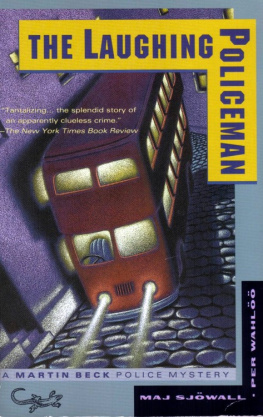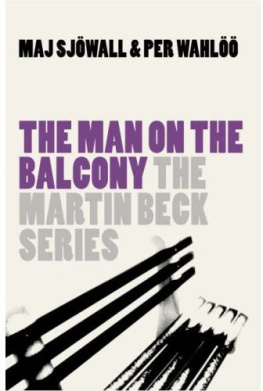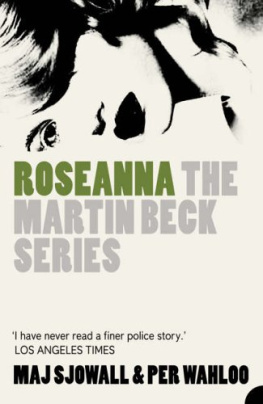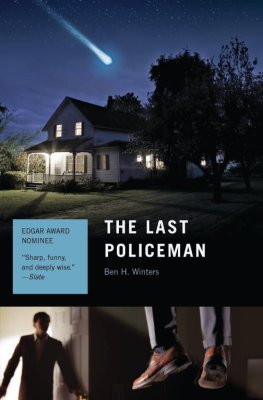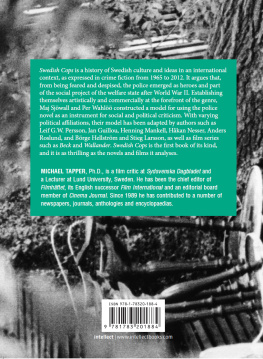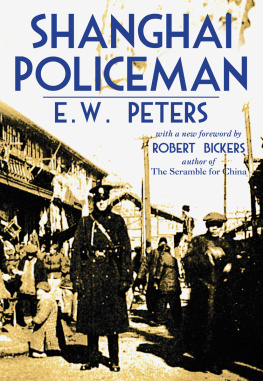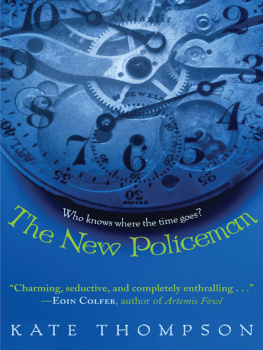maj sjowall (1935-) and per wahloo (1926-1975) were husband and wife. They were both committed Marxists and, between 1965 and 1975, they collaborated on ten mysteries featuring Martin Beck, including The Terrorists, The Fire Engine That Disappeared and The Locked Room. Four of the books have been made into films, most famously The Laughing Policeman, which starred Walter Matthau.
From the reviews of the Martin Beck series:
'First class' Daily Telegraph
'One of the most authentic, gripping and profound collections of police procedural ever accomplished
michael connelly
'Hauntingly effective storytelling'
New York Times
'There's just no question about it: the reigning King and Queen of mystery fiction are Maj Sjwall and her husband
Per Wahloo'
The National Observer
' Sjwall /Wahloo are the best writers of police procedural in
the world'
Birmingham Post
Also by Maj Sjwall and Per Wahloo
Roseanna
The Man Who Went Up in Smoke
The Man on the Balcony
The Fire Engine That Disappeared Murder at the Savoy
The Abominable Man
The Locked Room
Cop Kill ller
The Terrorists
MAJ SJOWALL AND PER WAHLOO
The Laughing Policeman
Translated from the Swedish by Alan Blair
HARPER PERENNIAL
London, New York, Toronto and Sydney
Harper Perennial An imprint of HarperCollinsPublish ers 77-85 Fulham Palace Road Hammersmith London W6 8JB
This edition published by Harper Perennial 2007
This translation first published by Random House Inc, New York, in 1970 Originally published i n Sweden by P. A. Norstedt 8c Sanders Fo rlag
Copyright Maj Sjwall and Per Wahloo 1968 PS Section Richard Shephard 2007
PS is a trademark of Har per CollinsPublishers Ltd
Maj Sjwall and Per Wahloo assert the moral right to be identified as the authors of this work
A catalogue record for this book is available from the British Library
This novel is entirely a work of fiction. The names, characters and incidents portrayed in it are the work of the author's imagination. Any resemblance to actual persons, living or dead, events or localities is entirely coincidental.
ISBN 978-0-00-724294-8
Set in Minion by Palimpsest Book Production Limited, Grangemouth, Stirlingshire
Printed and bound in Great Britain by Clays Ltd, St Ives pl c
All rights reserved. No part of this publication may be reproduced, stored in a retrieval system, or transmitted, in any form or by any means, electronic mechanical, photocopying, recording or otherwise, without the prior written permission of the publishers.
This book is sold subject to the condition that it shall not, by way of trade or otherwise, be lent, re-sold, hired out or otherwise circulated without the publisher's prior consent in any form of binding or cover other than that in which it is published and without a similar condition including this condition being imposed on the subsequent purchaser.
INTRODUCTION
The Laughing Policeman is the only Swedish novel ever to have been made into a Hollywood movie. The film appeared in 1973, five years after the book's Swedish publication, and starred Walter Matthau, transposing the story to San Francisco. It's not hard to see what attracted Hollywood's attention. In an austerely reali stic setting, Sjwall and Wahloo begin their story with a tour de force. A bus crashes in a quiet Stockholm street On board are the driver and eight passengers. All of them are dead, except for one critically injured passenger. They have all been shot. One of the dead is ke Stenstrm , a young police detective. He was off-duty but carrying a pistol. What was he doing on the bus? Was his presence there a coincidence? He was sitting next to a young nurse: did he know her? Was he having an affair with her? (Absurdly, the filmmakers dispel much of the mystery in advance by beginning not with the bus crash but with the events leading up to it, answering questions in the opening sequence that, in the book, are only answered late in the story.)
The first clues are equally tant alizing. When Sjwall and Wahloo 's regular detective , Martin Beck, searches Stenstrm 's desk, he finds an envelope containing nude photographs of the dead ma n's girlfriend. Why did Stenstrm take them? 'To look at,'
Martin Beck comments. But why did he keep them on his desk and not at home? The injured passenger regains consciousness for a few seconds and gives the following interview, recorded by one of the detectives:
'Who did t he shooting?
' Dnrk '
'What did he lo ok like?' 'Koleson:
Then he dies. The police listen to the tape over and over again. Are they meaningless syllables?
These are all, in their very different way, the sort of enigmas that Agatha Christie might have conceived, and there is no doubt that Sjwall and Wahloo took pleasure in the conventions of classic crime fiction. They even based a later book on that most artificial of forms, the 'locked room mystery' (in The Locked Room, 1973). But the Golden Age detective stories of Agatha Christie and John Dickson Carr had a semi-mythical setting in which the mystery is everything. Christie's Murder on the Orient Express is plainly based on the Lindbergh baby kidnapping, but the author has no interest in motivation or social context beyond what is necessary for the plot. For Hercule Poirot, a murder scene has the abstract interest of a crossword puzzle or a chess problem.
For the Swedish couple, however, the contrivances of detective fiction must always be grounded in reality. The discovery of the bus occurs only in chapter two of The Laughing Policeman - for this book was published in 1968 and chapter one describes, brilliantly and amusingly, an anti-Vietnam War demonstration outside the American embassy in central Stockholm. It is often poi nted out that Sjwall and Wahloo were Marxists, and, while the Martin Beck novels are far from being works of agitprop, they are embedded in history. A relevant quotation might be from the famous opening of Marx's essay, The Eighteenth Brumaire of Louis Bonaparte: 'Men make their own history, but they do not make it just as they please; they do not make it under circumstances of their own choosing...'
It is these circumstances - unpredictable, messy, confusing -that define t he fiction of Sjwall and Wahloo . When Beck arrives at the bus, the incompetent police officers have already tramped all over the scene, obscuring evidence. Even the more competent policemen are for from being detached investigators. They bring their own problems and experiences into the investigation. Some are simply biased or politically reactionary. Others are from the provinces, in the north and the south, uncomfortable in the rough cosmopolitanism of Stockholm. Stenstrm 's sexual explorations, as expressed in his photographs, infect Kollberg and his own relationship. One thinks of Ingmar Bergman's priests, distracted from their pastoral duties by t heir own spiritual problems. Sjwall and Wahldoo 's policemen are plagued by doubts about what it is to be policemen and what they are for: 'There's a latent hatred of police in all classes of society,' says one of them. 'And it needs only an impulse to trigger it off.'
Above all there is Martin Beck, the prototype of the brilliant tormented detective: Thomas Harris's Will Graham, Ian Ran kin's John Rebus, Henning Mankell 's Kurt Wallander, and many others, owe their existence to him. Beck's malaise is all the more effective for being only partially articulated. There is almost a surfeit of causes: his weariness after years as a detective, his failures as a family man and, suffusing everything in all the books, a sense that something has gone profoundly wrong in social democratic Sweden, as if the crimes he faces are superficial symptoms of a much deeper historical crisis.
Next page
